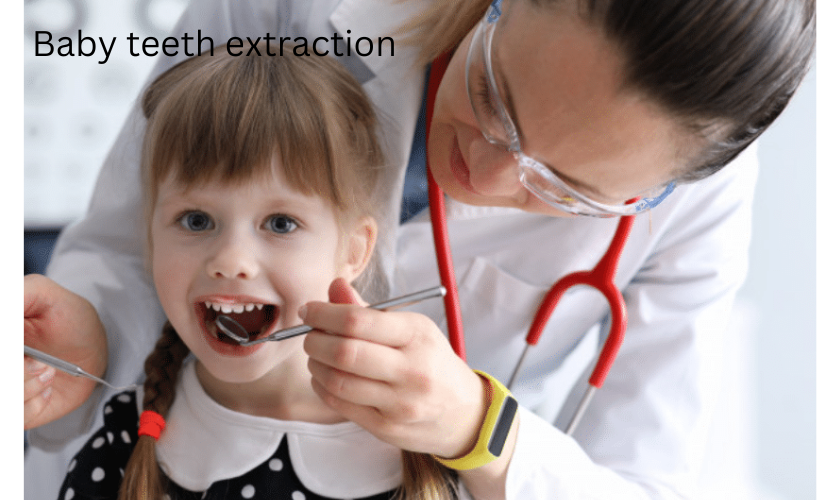An oral surgeon or dentist will remove a baby tooth during a baby teeth extraction operation. Although baby tooth extraction can be nerve-wracking for parents and kids, it is a far more straightforward process than an adult tooth extraction.
Tooth extraction in children
Baby tooth extraction too soon can cause issues as adult teeth develop. When adult teeth first emerge, usually between the ages of 4 and 7, baby teeth, often known as “primary” teeth, assist in creating a “route” that the adult teeth follow.
In the dental office, extraction of a tooth is never the first option. The other teeth may shift to fill in the gap after performing a baby tooth extraction before the permanent tooth appears, which might lead to difficulties.
-
Extreme tooth decay, which is not fixable with a filling
The enamel, or covering, of primary teeth is thinner than that of permanent teeth, so they are more likely to get cavities. Also, kids’ teeth may be more likely to get cavities if they eat a lot of sugar or don’t take care of their mouths well.
If the decay is too deep or extensive, the tooth may not be able to be saved and may have to be taken out.
-
Damage or injuries to the mouth
Accidents fall, and other injuries can hurt a child’s baby teeth. When a baby’s tooth is chipped, cracked, or pulled out of its socket, it can hurt and make the gums sensitive.
-
To get ready for braces or other orthodontic care.
Baby teeth that haven’t fallen out on their own at the right age are said to be “over-retained.” Dentists usually say you should remove baby teeth so that the adult teeth can come in correctly.
Depending on the damage, the tooth may be saved by pediatric pulp therapy (also called a “baby root canal”) or a full-coverage crown. Sometimes the tooth has to be taken out, and a space maintainer put in its place until the adult tooth comes in. For example, if a pimple forms on the gums near the tooth.
-
Severe gum disease (rare)
The gingival tissues become inflamed when you have gingivitis. It causes the gum tissue to bleed, red, and swell up.
If gingivitis is not treated, it can lead to pediatric periodontal disease (PD). Periodontal disease is a severe oral disease that affects the gums and jawbone. It is rare in people who don’t have a problem with their whole body or were born with it.
-
Baby teeth that are extra or aren’t the right shape (rare)
People are sometimes born with extra baby teeth because of a body problem. This additional baby teeth extraction is necessary, so permanent teeth can grow properly. There are some rare situations where there is a need for baby teeth extraction.
Conclusion
Most pediatric dentists only suggest tooth extraction as a last resort when all other therapeutic alternatives have failed. Talk to the dentist in Fort Worth about different options whenever possible because having a tooth out too quickly might affect a child’s speech, chewing, and developmental issues. Additionally, if your dentist must extract baby teeth due to damage or decay, ask them to insert a space maintainer so that permanent teeth can emerge adequately when the time comes. Otherwise, as your child gets bigger and their permanent teeth are ready to erupt, the baby teeth they currently have could move awkwardly and cause issues.


